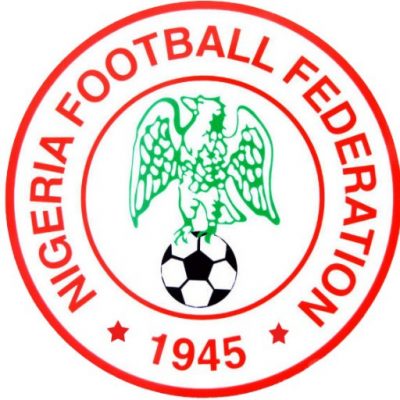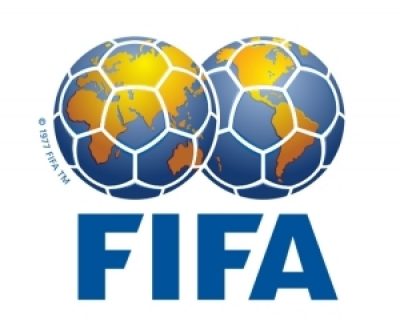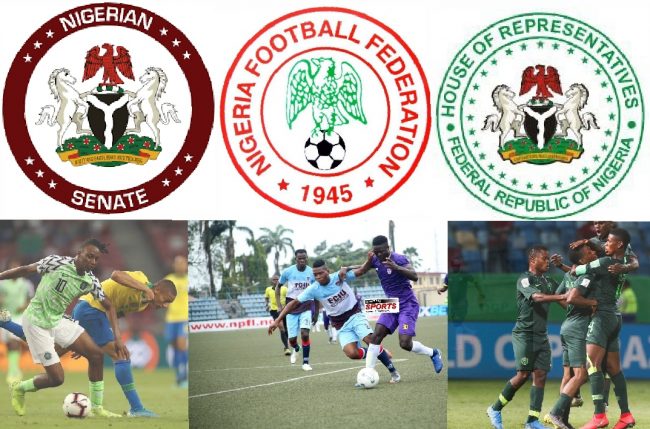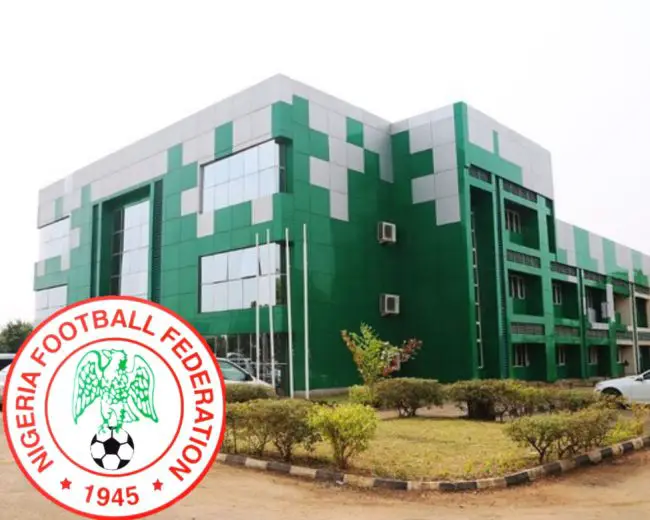By Chiemeka Felix Nwosu
Evolving an appropriate legal framework for the administration of Nigerian football has been a thorny issue which has widespread legal implications for the Nigeria Football Federation. The infamous Decree 101 was reputed to be one of the tools used by the Government to maintain it’s strangle-hold on football administration in Nigeria. This legal conundrum ultimately culminated in acrimonious litigations by aggrieved parties with the sport being negatively impacted. Even regulatory issues revolving around football administration had to be ventilated in the regular courts in spite of the provisions of the FIFA statutes confirming the contrary.
On several occasions, the FIFA hammer of indefinite ban dangled over the head of Nigerian football like the sword of Damocles following the ventilation of one football related matter or the other in Court. The authorities would however, scurry close to the deadline to resolve whatever issue that has generated the controversy and pretend all is well again, at least until another litigation is filed by an aggrieved Federation member. This has been a recurrent cycle for more than two decades.

Thankfully, it appears we are about to experience some light at the end of the tunnel with the passage of the Bill to repeal the Nigeria Football Association Act. Following the consideration and the passage of the Bill for an Act to repeal the Act and enact the Nigeria Football Federation and other matters connected therewith 2019 by the Senate and the House of Representatives, on Tuesday, 30th May, 2017 and Thursday, 8th March, 2018 respectively. Accordingly, the Senator Obinna Ogba-led Senate Committee and Hon. Danburam Abubakar Nuhu-led House of Representatives Committee set up a Conference committee to reconcile the areas of differences and came up with a report sometime in May, 2019. The thrust of this article is to highlight the major areas of the proposed amendments in the Bill and their impact on football development in Nigeria.
The Senate has finally passed the long-awaited Nigeria Football Federation (NFF) bill after copious political bickering and horse-trading. Prior to this time, Nigeria was operating within the framework of the Nigerian Football Association (NFA) Act which overtime proved to be insufficient in aligning our interest with global standard practices or more so fostering a smooth football administration in the country.
It is pertinent to start this analysis by highlighting the decision of the Federal High Court in Sam Jaja v. NFF & Ors, where the court held that the national law recognizes only the Nigeria Football Association (NFA) under the NFA Act still in force and not the Nigeria Football Federation. In the aforesaid case one of the several contentions brought before the court was whether in construing the circumstances of the case, FIFA laws could be said to rank superior to domestic laws, to which Hon. Justice Okorowo held that although FIFA statutes were recognized as the law governing football all over the world and notwithstanding also that Nigeria as a member ought to be bound by it, there was no indication that it had been domesticated in Nigeria and as such, for it to have a force of law in Nigeria, it must be domesticated. The learned justice then further held that both the Nigeria Football Federation (NFF) and FIFA statutes with their respective provisions on arbitration had no force of law in Nigeria and as such could not operate to bar the plaintiff’s right of access to court.
With the greatest respect to His Lordship, this decision is flawed on a number of grounds. First, it glosses over the fact that the Nigeria Football Federation is a member association of FIFA. Secondly, by virtue of being a member Association, Nigeria is by the ipsissima verba of Article 18 of the FIFA Statute, a stakeholder of FIFA. Most importantly, Article 8 of the statute provides that all bodies and officials must observe the Statutes, regulations, decisions and Code of Ethics of FIFA in their activities. Nigeria has been known to be one of the biggest beneficiaries of FIFA grants. Therefore, the argument that until the FIFA statute becomes domesticated, it has no force of law in Nigeria, is fundamentally flawed and grossly anachronistic to the dynamics and workings of modern-day football. This is however, not the thrust of the present article.
Major Highlights of the proposed Bill
One of the controversies that have been put to bed by the enactment of the Bill is the issue of the proper name of the Football Federation. Whilst it was known as the “the Nigeria Football Association” under the original law establishing the body, the name was eventually changed to Nigeria Football Federation, its current name. It would be recalled that this was one of the issues addressed by the court in the Sam Jaja’s case following an objection raised as to the current appellation, Nigeria Football Federation not having the requisite legal backing since the amendment was made without amending the Act. Section 5(1) of the Bill now provides as follows “there is hereby established for the Federation, a body to be known as the Nigeria Football Federation Congress or General Assembly (referred to as “the Congress”). The Congress shall consist of all the accredited members of the Federation as outlined in the Statutes of the Federation.
Also Read: The Professional Athlete as an Employee Within The Context of The NPFL Rules
By Section 9 of the Bill, it is provided that “as from the commencement of this Bill, the statutes of the Federation may permit non-juridical persons, associations or groups to participate in the activities of the Federation to such extent as the Federation deems fit but, excluding the right to vote at and be counted for the quorum of the Congress of the Federation. This provision is in tandem with Article 19(1) of the FIFA Statute which requires each member association to manage its affairs independently and without undue influence from third parties. It would be recalled that one of the criticisms levied against the infamous Decree 101 was the provision usurping the administrative duties of the NFF (then NFA) Executive Committee. The Decree was reputed for flouting the democratic ideals enshrined in the FIFA Statute. This amendment, whilst ensuring private partnership with the egg heads in the glass house ensures that the independence of the NFF is not compromised.

Of paramount importance is the dispute resolution provisions of the Bill which provides in Section 4 (2) (s) that all disputes within the Federation and football matters shall be resolved through the alternative dispute resolution mechanisms enshrined in the statutes of the Federation and other football governing bodies including those of CAF, FIFA and Court of Arbitration for Sports (CAS). The decisions obtained through such alternative dispute resolution mechanisms shall be final and binding on all parties to the disputes.
Section 4 (2) (t) provides that participation being voluntary, its members and all participants shall be deemed to have undertaken to waive their rights to take the internal disputes of the Federation and football matters to ordinary courts of law and to resolve all such disputes only through the alternative dispute resolution mechanisms provided in the Statutes of the Federation. Again, this provision is a provision that is in sync with Article 59 of the FIFA Statute which provides that the confederations, member associations and leagues shall agree to recognize CAS as an independent judicial authority and to ensure that their members, affiliated players and officials comply with the decisions passed by CAS. Article 59 (2) of the FIFA Statute prohibits recourse to ordinary courts of law unless specifically provided for in the FIFA regulations. Recourse to ordinary courts of law for all types of provisional measures is also prohibited.
Indeed, the dispute resolution provisions under the Bill is in line with Article 59 (3) of the FIFA Statute which provides that a member association shall insert a clause in their statutes or regulations, stipulating that it is prohibited to take disputes in the association or disputes affecting leagues, members of leagues, clubs, members of clubs, players, officials and other association officials to ordinary courts of law, unless the FIFA regulations or binding legal provisions specifically provide for or stipulate recourse to ordinary courts of law.
Instead of recourse to ordinary courts of law, provision shall be made for arbitration. Such disputes shall be taken to an independent and duly constituted arbitration tribunal recognised under the rules of the association or confederation or to CAS. This, the NFF has done with the enactment of the new statute. For the purpose of resolving the myriad of football related disputes that the Federation has had to face from disgruntled members, this provision is very commendable. However, posers remain on whether this entirely solves the whole problem with the decision of the Brussels Court of Appeal in the case of RFC Seraing v Doyen Sports where the Court opined that the arbitration clause enshrined in Art. 59(1) of the FIFA Statutes is too broad to be valid since its scope is not limited to a specific legal relationship. Member Associations of FIFA like the NFF have been known to adapt this dispute resolution in the FIFA statute hook, line and sinker without applying it to their peculiar situations. The writer takes the humble view that every arbitral process is expected to enjoy some measure of autonomy particularly as regards the choice of arbitrator and the applicable law. The FIFA statute, however, appears to be an exception with member Federations and their constituents expected to voluntarily submit to the arbitral procedure of the Court of Arbitration for Sports by virtue of their membership with FIFA.
Whilst this amendment may have addressed the avoidable imbroglio and decisions in the Sam Jaja and Giwa cases, it is only a matter of time before another vigorously contested litigation presents another opportunity for a judicial pronouncement on these provisions. For now, we can only congratulate the two legislative chambers for resolving an issue which has remained an albatross to the development of our football.

Other notable high points of the Bill.
Self-Governance: The bill creates an Executive Committee to replace what was known as the NFA Governing board in the Act and a General Assembly to replace what was known as the Council in the Act. Unlike the Governing board whose representation consisted of nominees and appointees, the Executive committee members are all elected to the offices, a major criterion being that they must have been active participants in football administration. The General assembly on the other hand assumes a legislative role tasked mainly with the handling of the Association’s decision making, paperwork and conducting elections to the executive committee. It is important to note that these bodies like the NFF nomenclature, are already in existence, its inclusion merely to bring its workings on all fours with the existing FIFA Statute
Financial management: While the Bill laid down sources of the federations funding most of which are still dependent on Government disbursements, one would have expected a provision that aims at attaining self-sufficiency for the NFF. It makes no sense that the same Government that has been vilified for stunting the growth of football is still expected to fund the NFF. Nonetheless, the Amaju-Pinnick led Board has been known to have reliable sponsors like the Aiteo Group. One would have also expected to see audit provisions in the Bill to tackle the rising and embarrassing spate of corruption allegations levied against the Executive Committee members of the NFF. A provision requiring the NFF to publish its audited account for the public’s perusal at periodic intervals should have been included.
In conclusion, it is the writer’s humble view that the passage of the Bill by the National assembly is a step in the right direction however, there may be need for subsequent amendments in the future to ensure that the legislation is in line with international best practices.
Felix Nwosu is an Associate with Perchstone & Graeys LP and a member of the Sports law team of the firm.
Disclaimer: The present article reflects only some personal views and general remarks drawn from a legal analysis of the Bill for the enactment of the Nigeria Football Federation Act, 2019 and should not be regarded as a legal advice or bind the author in any way. The author confirms he has no professional involvement in this particular matter whether past or present.
References
1. Suit no: FHC/ABJ/CS/179/10
2. Section 6 of the Bill.
3. https://sportsbarng.com/fifas-enforced-arbitration-is-the-cas-gradually-losing-its-relevance-in-sporting-disputes-steve-austin-nwabueze.
4. Section 3 of the Bill.
5. Section 6 of the Bill
6. Section 4 of the Bill
Got what it Takes?
Predict and Win Millions Now












